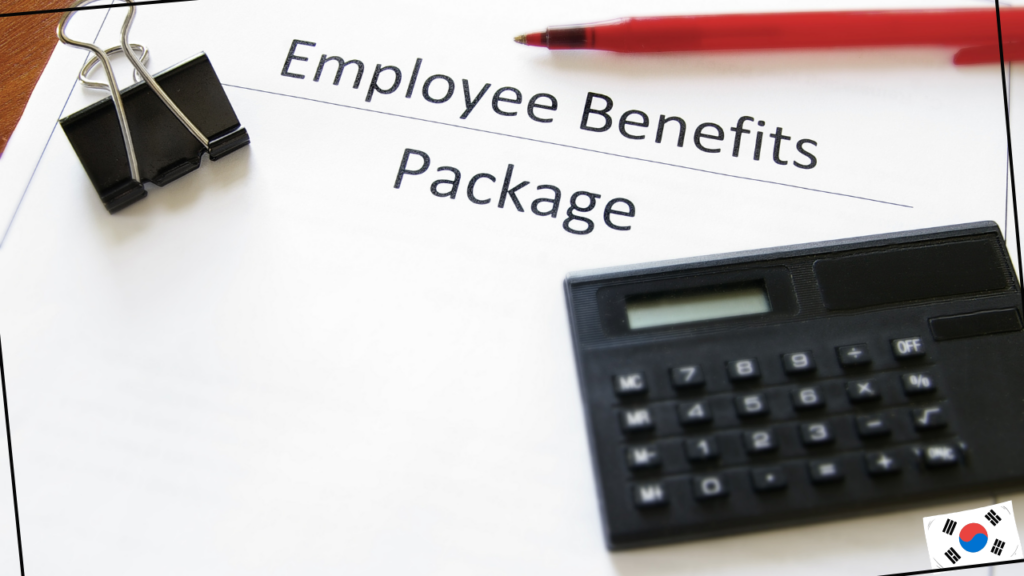
Employee benefits are a crucial part of working life in Korea, affecting both employees’ quality of life and companies’ competitiveness. Understanding benefits helps workers know their rights and allows employers to build better workplace environments. Whether you are a foreign professional in Korea, a new hire, or an HR manager, it’s essential to stay up-to-date on the full range of e-benefits available in Korea’s dynamic job market.
This FAQ-style article explains the main types of benefits in Korea, covering both legally required and voluntary perks, and answers the most common questions employees and employers may have.
What Are the Mandatory Employee Benefits in Korea?
Korean labor law mandates several employee benefits that all companies must provide to regular employees. These core benefits include:
- National Pension (국민연금): Both employer and employee contribute to the national pension scheme, which provides retirement, disability, and survivor benefits.
- National Health Insurance (건강보험): Covers medical costs for illness, injury, and preventive care. Both parties share contributions.
- Employment Insurance (고용보험): Supports employees in case of unemployment, maternity leave, or vocational training.
- Industrial Accident Compensation Insurance (산재보험): Covers workplace injuries and occupational diseases.
- Paid Annual Leave: Employees with at least one year of service are entitled to paid annual leave (usually 15 days for full-time staff).
- Public Holidays: All legal holidays must be observed, and extra pay is required for working on these days.
- Severance Pay (퇴직금): Employees who have worked for at least one year are entitled to a lump sum severance payment upon leaving.
What Are Common Additional Employee Benefits Offered by Companies?

Many Korean companies go beyond the basics to attract and retain talent. Popular additional employee benefits include:
- Meal Allowance: Monthly or daily meal stipends or company cafeterias.
- Commuting Allowance: Transportation subsidies for commuting to and from work.
- Performance Bonuses: Annual, quarterly, or project-based bonuses for hitting targets.
- Housing Allowance or Support: Some firms (especially chaebols or foreign-invested companies) provide rental subsidies or dormitory housing.
- Childcare Support: On-site daycare, childcare subsidies, or flexible hours for parents.
- Wellness and Fitness Programs: Subsidized gym memberships, yoga classes, or in-house fitness centers.
- Company Retreats (워크샵): Annual or biannual trips for team-building.
- Long-Service Awards: Gifts or bonuses for milestone years of service.
- Medical Checkups: Annual health screenings, often more extensive than national requirements.
- Flexible Work Arrangements: Options for remote work, flextime, or compressed workweeks are increasingly popular after the pandemic.
Are There Unique Employee Benefits in Korea Compared to Other Countries?

Yes. Benefits in Korea often reflect the nation’s work culture and societal norms:
- Family-Oriented Benefits: Strong support for maternity/paternity leave and family events.
- Holiday Gifts: Many employers provide gifts for major holidays like Chuseok and Lunar New Year.
- Education Support: Subsidies for employee or child education, language training, and professional development.
- Birthday and Anniversary Gifts: Small bonuses or gifts on personal milestones.
- After-work Gatherings: Company-sponsored dinners (회식) and events to encourage team bonding, though these are less mandatory than in the past.
How Do Subscription Business Ideas Relate to Employee Benefits?
In the modern workplace, some firms now include services inspired by Subscription Business Ideas as part of their employee benefits. Examples include monthly wellness app subscriptions, learning platform memberships, or regular deliveries of healthy snacks and office supplies, all aimed at improving employee satisfaction and productivity.
What Are the Legal Rights if Employee Benefits Are Not Provided?
If a company fails to provide mandatory benefits, employees have the right to file a complaint with the Ministry of Employment and Labor (MOEL). Employers found violating labor laws may face fines or legal action. Always keep official payslips and records as proof.
How Can Employees Maximize Their Employee Benefits in Korea?
- Review Contracts Carefully: Ensure all agreed employee benefits are included in your contract.
- Ask HR for a Full List: Don’t hesitate to request a comprehensive guide to all available employee benefits.
- Participate in Company Programs: Engage in wellness or education programs to maximize what’s on offer.
- Track Your Rights: Be aware of mandatory versus optional employee benefits.
Conclusion
Employee benefits in Korea cover much more than the basics, ranging from statutory protections to unique cultural perks and innovative extras. For employees, understanding your full range of employee benefits is essential to making the most of your career. For employers, offering competitive and relevant employee benefits is key to attracting and retaining top talent in Korea’s fast-paced economy.
If you have questions about your specific package or wish to suggest new benefits, don’t hesitate to reach out to your HR department or local labor office.